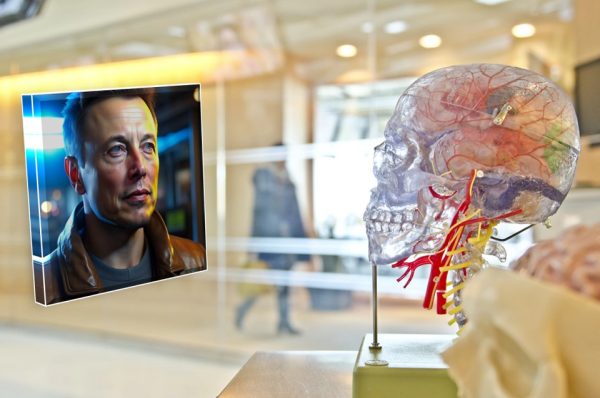
Elon Musk – Neuralink Has Implanted Interactive Chip In Human Brain
Elon Musk Founder of Neuralink – a neurotechnology company announced this week that Neuralink successfully implanted interactive chip in human brain. Neuralink has been actively working on developing brain-computer interface (BCI) technology, including a chip implant designed to enable direct communication between the brain and computers or other external devices.
On his X account, Elon Musk announced the news and said patient, who wasn’t identified, “is recovering well and Initial results show promising neuron spike detection,” referring to the cellular activity between our brains and our nervous systems.
The announcement came after Neuralink began recruiting potential human test subjects for its clinical trial. The trial is called PRIME 9 Precise Robotically Implanted brain Computer Interface. The technology uses robot to surgically insert the wires of the implant into a part of the human brain that is related to movement. It is designed to interpret humans neural activity and will be able interpret using the smart devices. The chip is about the size of a coin and would be embedded in a person’s skull. To avoid damage to brain cortex, for implant procedures custom made microscopic needles are utilized that have tips 10-12 micron width slightly larger than a RBC. The implant includes 1024 electrodes distributed across 64 threads.
More about Neuralink’s chip implant;
The first Neuralink product is called Telepathy – Elon Musk
FDA approval: Neuralink got FDA approval for the trial last year in May, saying it wanted to enlist people ages 22 and above who are living with quadriplegia due to a spinal cord injury or amyotrophic lateral sclerosis (ALS), the disease that robs people of the ability to control their bodies.
Purpose: The primary goal of the Neuralink chip implant is to enhance human capabilities by allowing direct interaction between the brain and external devices. This could potentially be used to treat neurological disorders, restore sensory functions, or even augment cognitive abilities.
Implant design: Neuralink has developed a small, flexible chip that is surgically implanted into the brain. The chip consists of thousands of tiny electrodes, thinner than a human hair, which can both record neural activity and stimulate neurons.
Wireless connectivity: The chip communicates wirelessly with external devices, such as smartphones or computers, allowing for bidirectional information exchange between the brain and these devices.
Testing: Neuralink had conducted extensive testing of its technology on laboratory animals, primarily rats and pigs. These tests demonstrated the feasibility and safety of the implant.
Human trials: Neuralink initially focused on individuals with neurological conditions such as paralysis. These trials would involve implanting the chip and assessing its effectiveness in restoring lost functions or enabling new ones.
Challenges and ethical considerations: The development of brain-computer interface technology raises significant ethical, privacy, and safety concerns. These include issues related to consent, potential misuse of the technology, data security, and the long-term effects of brain implants.
It is worth noting that the field of brain computer interfaces is rapidly evolving, and Neuralink technology is promising development.
References:
- https://twitter.com/elonmusk
- https://www.npr.org/2024/01/30/1227850900/elon-musk-neuralink-implant-clinical-trial
- What to know about Elon Musk’s Neuralink brain chip implant – ABC News (go.com)
- https://www.wsj.com/tech/elon-musk-says-neuralink-has-implanted-brain-chip-in-human-127a6f56
- Image credit: https://unsplash.com/@jessedo81?utm_content=creditCopyText&utm_medium=referral&utm_source=unsplash
- https://pixabay.com/users/sunrisepohtam-22962316/?utm_source=link-attribution&utm_medium=referral&utm_campaign=image&utm_content=8162220
Author: Sumana Rao | Posted on: February 1, 2024
« Low Sodium Levels or Hyponatremia Causes And Solutions Benefits Of Drinking Cannabis CBD Tea »






















Write a comment